|
The
Royal Squadron, formerly the Royal Kent Hotel
Prior to 1780 Ryde
town was divided into two separate settlements, upper
and lower Ryde, In lower Ryde were the huts of the longshoremen families, largely engaged in ferrying passengers and goods, and piloting ships.
At the top of the steep rise was an agricultural community.
The two settlements were connected by a track
which roughly followed the route of the present
day St Thomas Street.
Union Street was created in 1780 to join the two villages
together. The width of the street (Originally
two way) is reputed to have derived from the
need to turn a horse and cart around in one single
turn. The Royal Squadron building is situated at 70
Union Street, Ryde.
The Royal Squadron was formerly known as the Royal
Kent
Hotel (Built in 1835),
and is reputed to be where Queen Victoria and Prince Albert
stayed whilst making plans for Osborne House, they
also held court on the first floor whilst Osborne
House was being built.
The Queen and many other Royal visitors
frequented the town and stayed in the hotel on
several occasions but although popular with the
Royals, Union Street was not always the privilege
of the rich and famous and in the Summer of 1837 the
'Ryde Riots' (When the Tory, Mr Holmes, was elected)
took place outside the hotel.
The first
proprietor was a Mr Alexander Stephens who boasted
that the newly built hotel was....
|
|


|
"Situated
in the principal street of the town, distant
but a minute’s walk from the Pier,
commanding most extensive and beautiful sea
views, has been erected within the last two
years, and fitted up in a style of elegance
and comfort, including baths and every
convenience fit for the accommodation of
Aristocracy and Gentry, visiting the Island
for the season, or on a tour."
|
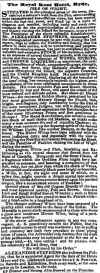
View
Transcript
|
The
capacious cellars had been stocked, "at an expense of several thousand
pounds", with a vast choice of Wines,
Spirits, Liqueurs and Champagnes. Dinner and Strong Ales
were also brewed on the Premises.
|
This postcard indicates that the
hotel was also known as "Wheeler's
Hotel", Frank Wheeler is registered
at the address in 1883.
Note: The Royal crest above the
entrance. |
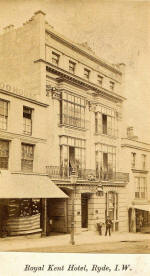
|
|
This postcard is in actual fact
labelled wrongly as this is Ryde
Pier, Victoria Pier was slightly
further East. Interestingly though
the image appears to align perfectly
with the photographers, Hughes &
Mullins slightly higher on Union
Street. |
 |
December, 1908, was very cold and
ended with a heavy snow-storm, as
the picture of Union Street shows.
Behind the bread delivery boy can be
seen the first floor bay windows of
the Royal Kent Hotel. One of the
early hotels in the town, it was
opened in 1835 by Alexander
Stephens. Queen Victoria and the
Prince Consort stayed there in the
mid 1840s.
Credit:
Edwardian Island - Roy Brinton |

|
|
In 1903 the hotel
had a brief spell of being known as
"Lorimer's
Royal Hotel" when Alexander Lorimer took over
the licence.
In 1912
(After his death) the assets were
sold at auction. |
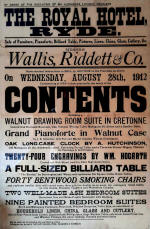
Picture credit: Rob Tulley |
 |
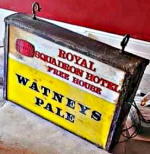 |
A couple of
old signs found in the cellars
images courtesy of Laura Weeks |
|
The
original Royal Squadron elephant bar
rails
still in use today.
|
A
selection of census results for
owners/tenants
|
1844 - Robert Tippen
|
1851 (Aged 41) - John/Susanna Pegg
|
1859 - Thomas Roper
|
1861 (Aged 34) - Sarah Whales
|
1865 - A Rayner
|
1871 (Aged 34) - Samuel James
Ditchfield
Samuel James Ditchfield was born
about 1837. In 1871, he was 34 years
old and lived in Ryde, Hampshire.
|
1871 (Aged 38) - Frank Wheeler
Frank Wheeler was born about
1833, his mother, Sarah, was 22. In
1871, he was 38 years old and lived
in Ryde, Hampshire, with his wife,
Augusta, and mother.
|
1881 (Aged 47) - Frank Wheeler
Frank Wheeler was born about 1834
in Carisbrooke, Hampshire, his
mother, Sarah, was 23. In 1881, he
was 47 years old and lived in Ryde,
Hampshire, with his wife, Frances,
and mother.
|
1885 - Frederick
William Lewis
|
1891 (Aged 35) - George S Purden
George S Purden was born about
1856 in Lichfield, Staffordshire. In
1891, he was 35 years old and lived
in Ryde, Hampshire, with his wife,
Laura, son, and daughter.
|
1891 (Aged 21) - Kate Plimmer
Kate Plimmer was born about 1870
in Gosport, Hampshire. In 1891, she
was 21 years old and lived in Ryde,
Hampshire.
|
|

Excerpt from London Gazette
bankruptcy listings
November 7th 1899
|
1901 (Aged 37) - Richard Griffiths
Richard Griffiths was born about
1864 in Cheshire. In 1901, he was 37
years old and lived in Ryde,
Hampshire, with his wife, Alice,
son, and 3 daughters.
|
1911 (Aged 73) - Jane Elizabeth
Lorimer
Jane Elizabeth Lorimer was born
about 1838 in Boddington,
Gloucestershire. On 2 April 1911,
she was 73 years old and lived in
Ryde, Hampshire, with her daughter.
|
1939 (Aged 67) - Hennietta M Parnell
Hennietta M Parnell was born on
18 March 1872. She lived in Isle of
Wight in 1939.
|
1939 (Aged 54) - Ethel M Liddell
Ethel M Liddell was born on 18
October 1885. She lived in Isle of
Wight in 1939 |
Excerpts taken from Ward Lock & Co's illustrated guide book of the Isle of Wight (1931/32).
|
 |
 |
 |
|
|
|
Recent
internal & external photos
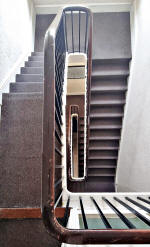 |
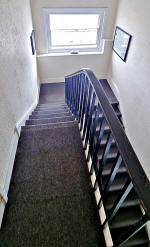 |
|
Top floor
views of the staircase
|
|
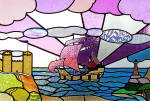
Stained glass window on the 1st floor.
Assumed to be
Carisbrooke Castle and St Catherines
lighthouse
|
|
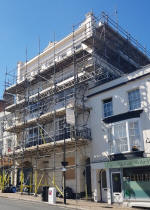 |
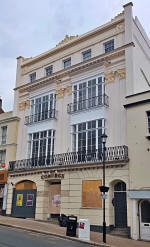 |
|
Before and after external painting, this was
completed during Spring 2020.
Note: The boarded windows due to 'lockdown' |
|
Grade
II listing
| Description:
The Royal Squadron Hotel |
Location:
70 Union Street, Ryde PO33 2LN |
| Grade:
II |
Locality:
Ryde |
| Date
Listed: 24 October 1950 |
County:
Isle of Wight |
| English
Heritage Building ID: 417031 |
Country:
England |
| OS
Grid Reference: SZ5924292846 |
Postcode:
PO33 2LN |
| OS
Grid Coordinates: 459242,
92846 |
|
| Latitude/Longitude:
50.7322, -1.1619 |
|
Large early C19 building with an elaborate front. Four storeys. Five
windows on the top floor. Stuccoed, ground floor rusticated. Continuous
iron balcony on first floor. Plain pilasters flanking the whole front
above the ground floor and carried up above the parapet.
Three pairs of
coupled and fluted Corinthian pilasters not projecting as far as these
and from first to second floor only. Between them on first and second
floors two large four-light bay windows containing French windows, with
individual iron balconies on second floor. Cornice above the bays, which
is continued along the front and supported by the Corinthian pilasters.
Modillion cornice above this.
Five windows on the third floor flanked
by plain pilasters, with frieze above and long recessed panel surmounted
by dentilled cornice and crested parapet. Glazing bars
intact. Entrance to yard through the ground floor at the South end.
|
|
|
|
|
| The ground
floor is now occupied by 'Coburgs' bar and music venue.
The name is derived from Queen Victoria's German
connections......
The Duchy of Saxe-Coburg-Saalfeld was one of the Saxon Duchies held by the Ernestine line of the Wettin Dynasty. Established in the 17th century, the Saxe-Coburg-Saalfield line lasted until the reshuffle of Ernestine territories that occurred following the extinction of the Saxe-Gotha line in 1825, in which the Saxe-Coburg-Saalfeld line received Gotha, but lost Saalfeld to Saxe-Meiningen.
Queen Victoria was raised under close supervision by her German-born mother - Princess Victoria of Saxe-Coburg-Saalfeld. She inherited the throne at the age of 18 after her father's three elder brothers died without surviving legitimate issue. She married her first cousin, Prince Albert of Saxe-Coburg.
Albert died at the early age of 42, plunging the Queen into a deep mourning which lasted for the rest of her life. Whilst in this long, drawn out period she would often seek solice at the Kent Hotel in
Ryde, reminded of happier memories with her husband. Upon Queen Victoria's death in 1901, their son, Edward VII, succeeded as the first monarch of the House of Saxe-Coburg and
Gotha.
So this is where the venues name comes from, the royal (and largely unknown) second name of Queen Victoria & Prince Albert - in memory of a building they held very dear to their hearts.
|
|